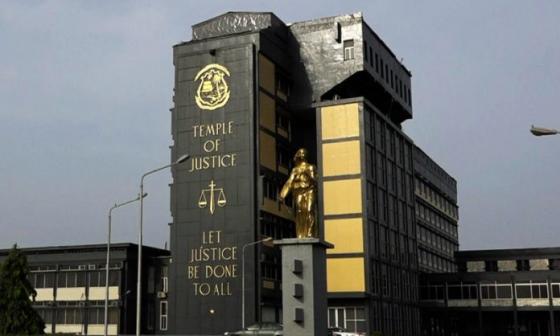Liberia: Salaries Harmonization to Blame for Judges’ Corruption?

Supreme Court of Liberia.
The establishment of judicial compensation is governed by constitutional principles designed to ensure public confidence in the independence and impartiality of the judiciary.
But that is not the case with the National Remuneration Standardization Act of 2019, in which many legal practitioners expressed contrary views, with some claiming that the reduction of judges’ salaries, allowance, and other benefits were reasons for the increase in corruption among judges.
The Executive Mansion, in an October 2019 statement announcing that President George M. Weah had signed into law the National Remuneration Standardization Act of 2019, said the legal instrument “is aimed at ensuring that salaries, allowances, and benefits across government are uniformed and equitable for work done, to ensure that the inequality gap in government is narrowed and controlled to the extent that public resources are managed properly and efficiently.”
Before the implementation of the salary harmonization, judges rejected the Act and filed a joint lawsuit against the government to the Civil Court. The judges described the harmonization of their salaries as “wrongful and illegal abolition and withholding of” their allowances.
Prior to the salary harmonization coming into force, judges were each paid monthly remuneration as follows: a taxable salary of L$$22,950; a non-taxable allowance of US$5,000; and 350 gallons of gasoline, which was later reduced to 135 gallons.
But, with the act, judges are now being paid the following remunerations: a taxable salary of US$5,000; allowance abolished; and the 135 gallons of gasoline maintained.
Essentially the judges have suddenly experienced a major spike in their taxable income, while their US$5,000 non-taxable allowance has been diminished to zero, leaving them with only the 135 gallons of gasoline as non-taxable benefit. This does not bode well for most judges who, by the Judicial Canon — the rules governing the judiciary — are not allowed to engage in any other business pursuit, and must maintain good moral character.
Article 72(a) of the 1986 Constitution of the Republic of Liberia says: “The Justices of the Supreme Court and all other judges shall receive such salaries, allowances and benefits as shall be established by law. Such salaries shall be subject to taxes as defined by law, provided that they shall not otherwise be diminished. Allowances and benefits paid to Justices of the Supreme Court and judges of subordinate courts may be law be increased by may not be diminished except under a national program enacted by the Legislature; nor shall such allowance and benefits be subject to taxation.
Judge Mardea Tarr Chenoweth of the 13th Judicial Circuit Court in Kakata, Margibi County, is one of those who bitterly opposed the salary harmonization exercise in 2020, contending that the new salary regime depresses all judges and undermines the effectiveness of the judiciary.
Speaking on the topic: “The effectiveness of judges in the face of salary harmonization”, during the opening of her court, Judge Chenoweth advised the executive to rethink said decision.
Judge Chenoweth then argued that judges should be well paid to ensure that they are not saddled with issues that might affect their ability to perform in the protection of fundamental rights and liberties. According to her, any adjustments to their salaries should have followed the simple principle of fairness and, take a consideration of the law, which, according to her, stops them from engaging in any other business.
It is universally established that judges, given their level of responsibility for the administration of justice and to the public trust, ought to receive commensurate salaries and benefits.
However, Judge Nancy Sammy of Criminal Court ‘B’ and president of the National Trial Judges Association of Liberia (NTJAL), believes that no amount of remuneration can eradicate the problem of corruption in the judiciary.
Speaking during the opening of Criminal Courts A, B, C, D, and E for Montserrado County, she did not directly correlate the enforcement of the 2019 Act to the rise in corruption in the judiciary. However, she accused some of her colleagues of being corrupt, saying that they are undermining the public trust in the core administration of justice in the country.
Judge Sammy believes that judges need to accept the fact that some of them are corrupt.
“Everybody is accusing us of being corrupt, and we have to face the fact, whether you like it or not. But the truth is, the issue of corruption is in the judiciary. The claim of Corruption is spilling over every one of us,” Judge Sammy said. “There are bad apples among us judges, but there are also good people among us, judges.”
Judicial Canon Six states in part that, “the judge is a government paid official and must be paid adequately; he holds an exalted position which prevents him from engaging in any business pursuit”.
Chenoweth argued that, according to the Canon, judges are barred from any other business pursuit and must live above reproach. According to her, judges are the only ones subjected to the requirement of “good moral character” as a condition precedent to holding the position of judgeship, as enshrined in Article 68(a) of the Liberian Constitution.
So the Government may be on point with the increase in taxable income, but it can be argued that they may have mis-stepped by reducing the judges’ allowances. However, the Government may be protected by a caveat in Article 72(a), which prohibits the allowances and benefits paid to judges from being diminished “except under a national program enacted by the Legislature”, hence the National Remuneration Standardization Act of 2019.
For now, it appears that the contentious balance between good moral conduct and adequate compensation of judges may be a debate in and out of court for many months to come. And the head of the judiciary, Chief Justice Francis S. Korkpor, may just leave it to his successor to address.
